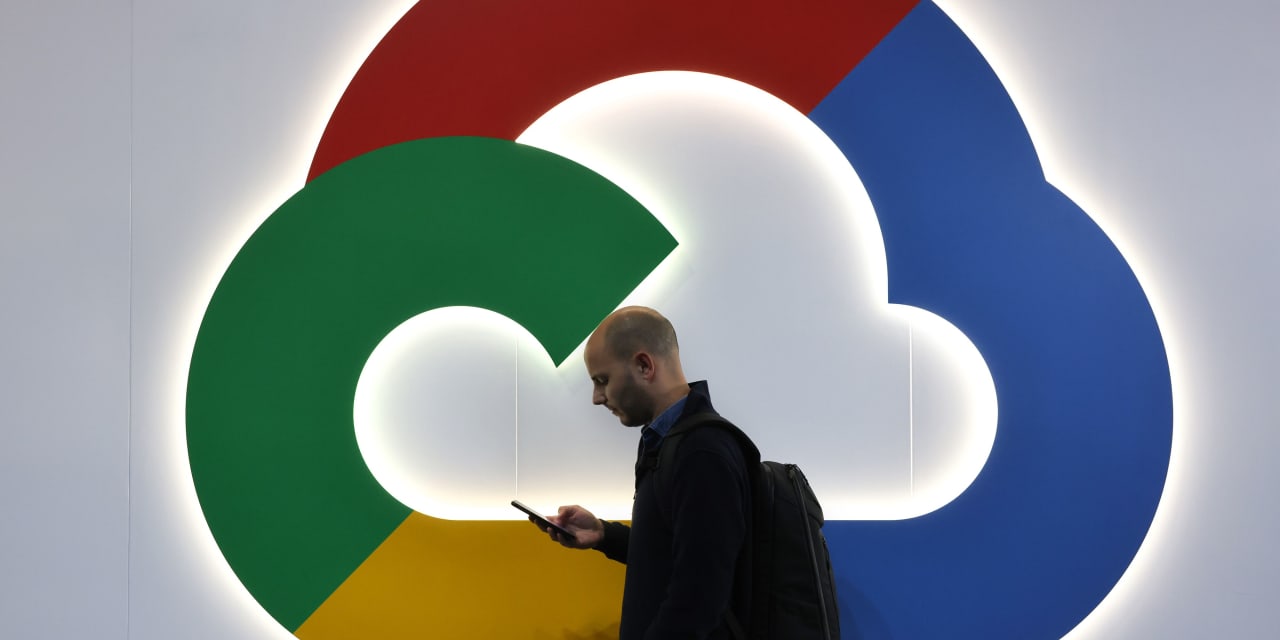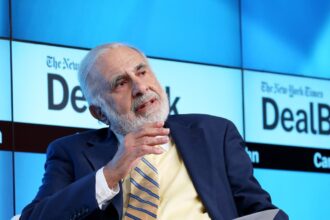Technology stocks slumped into correction territory this past week, after a wave of poorly received earnings reports from some of the world’s largest companies. On Wednesday and Thursday, the Nasdaq Composite fell 4.1%, the tech-heavy index’s worst two-day stretch of the year. The index has fallen 12% since July.
Results from
Alphabet
(ticker: GOOGL) and
Meta Platforms
(META) drew the most investor scrutiny. Both companies topped expectations, but the results led to fresh concerns about cloud and ad spending. Later in the week,
Amazon.com
CEO Andy Jassy stanched the bleeding with some enthusiastic comments about the outlook for artificial intelligence, but the message was clear: Investors’ zeal for Big Tech has faded.
Here are some key takeaways from this past week’s tech earnings:
Mixed weather for the cloud: Alphabet was the biggest decliner among the tech megacaps on the week, falling more than 10%, despite reporting revenue and profit that topped Wall Street estimates. Investors focused on softer-than-expected performance from Google Cloud, which saw revenue increase 22% to $8.4 billion in the quarter. That missed Street estimates by about $200 million, and it was down from 28% growth in the June period. On a conference call with analysts, Chief Financial Officer Ruth Porat said the cloud business was seeing the impact of “customer optimization efforts,” which is to say some IT execs think their cloud bills are still too high.
Alphabet’s cloud business is barely more than a tenth of the company’s total revenue, and just about 1% of operating income. Given the better-than-expected performance from Google search and YouTube, some bulls think the market overreacted.
But here’s the issue: The Street has been thinking that Google would leverage its prowess in AI software to boost its share of the cloud market. Google has unveiled a flurry of AI tools and services in recent months, including the Bard chatbot, which you can now use to search not just the web but also your own documents and emails. In fact, Google had been viewed as having deeper expertise in AI than rival Amazon Web Services. (More on AWS in a moment.)
As a result, expectations for Google Cloud were high heading into the quarter, and the business failed to deliver. Worse, Alphabet had the misfortune of reporting results within minutes of
Microsoft
(MSFT), which posted a blowout quarter that included better-than-expected results for its Azure cloud computing arm. Wall Street estimates had called for Azure to grow 25% to 26% on a constant currency basis, and instead it grew 28%.
Microsoft said Azure’s growth reflected a three percentage-point contribution from AI-related workloads, a point higher than the company had forecast. While Microsoft—like Google—continues to see customers optimizing their cloud spending, AI helped drive a big Azure beat. Azure isn’t just bigger than Google Cloud, it’s also now growing faster.
After its stock outperformed on the week, Microsoft is now threatening
Apple’s
(AAPL) title as the world’s most valuable company—the gap is down to about $115 billion. Microsoft shares have outperformed Apple shares by nearly 10 percentage points this year.
Cloud leader Amazon Web Services is growing more slowly than both of its smaller rivals. AWS sales increased 12.3% in the quarter to $23.1 billion, about in line with Wall Street estimates. That’s no disaster, but it’s hardly a blowout.
Still, Amazon (AMZN) investors found reason to be optimistic: CEO Jassy said on the company’s earnings call that AWS received some large orders late in the quarter that will show up in fourth-quarter results. That comment gave Amazon shares a big boost on Friday, and seemed to cheer up tech investors more generally.
“Companies have moved more slowly in an uncertain economy in 2023 to complete deals,” Jassy said on the Amazon earnings call, “but we’re seeing the pace and volume of closed deals pick up and we’re encouraged by the strong last couple of months of new deals signed.”
Advertising is buzzing. Or at least, it was: Alphabet and Meta each posted strong growth in their most important business—selling online ads. Google Search ad revenue rose 11%, while YouTube ads increased 12%. Meta’s ad revenue grew 28%, with ad impressions up 30%.
But Meta CFO Susan Li threw a wet blanket on the optimism when she told analysts that ad spending softened in the beginning of the fourth quarter, correlating with Hamas’ attack on Israel. She notes that a similar pattern unfolded at the start of the Ukraine war.
Snap
(SNAP) said something similar on its earnings call, noting that some brand-oriented ad campaigns paused when war broke out in the Middle East.
The biggest third-quarter ad win came from an advertising upstart: Amazon’s ad sales were up 26%, to $12.1 billion. That’s more than 10 times the size of Snap’s total business, and more than 50% bigger than YouTube’s ad business.
AI is a two-sided coin: For Microsoft, Meta, Alphabet, and Amazon, generative AI is a high-stakes, no-limit poker game that requires not just capital but also labor—in particular, costly coders. Meta finished its September quarter with head count down 24%, as part of its “year of efficiency” push; its operating margin in the quarter was 40%, up from 20% a year earlier.
But AI is throwing a wrench in all that efficiency. CEO Mark Zuckerberg said that Meta would increase capital spending and ramp up hiring in 2024.
Meta sees 2024 capital spending of $30 billion to $35 billion, up roughly 15% from this year’s level. That’s a lot of dough, but the growth is actually slower than investors had anticipated, which is trouble for
Arista Networks
(ANET). The provider of networking gear counts on Meta and Microsoft for 50% of sales. Arista share fell 8% Thursday, trimming its valuation by nearly $5 billion.
Looking beyond the cloud, there were some AI winners this past week. A few months ago,
IBM
(IBM) launched WatsonX, an effort to help large companies with AI initiatives. IBM’s earnings report edged estimates, but the big news came when CEO Arvind Krishna disclosed the company had bookings in the “low hundreds of millions of dollars” for AI-related projects in the September quarter. That suggests an annual run-rate of about $1 billion—not too shabby for a service that only launched in July. IBM shares were up 4.6% on its earnings report.
PCs are back:
Intel
shares (INTC) spiked as much as 10% Friday after the chip maker posted strong third-quarter results. Revenue was actually down 8% from a year earlier, but results were at the high end of the company’s forecast. Additionally, Intel’s fourth-quarter revenue guidance suggests a return to growth ahead. Intel said it signed up three customers during the quarter for its cutting-edge “18A” chip manufacturing capacity and expects to sign a fourth in the December quarter. While it would be nice to know who the customers are—Intel isn’t saying—it suggests the company’s bet-the-ranch strategy to take on
Taiwan Semiconductor
(TSM) in contract chip manufacturing is getting some traction. Intel rival
Advanced Micro Devices
(AMD) reports third-quarter results on Tuesday. It will be the next test for the potential PC rebound.
You’re up, Tim Cook: This coming week is all about Apple, starting with a rare prime-time product launch on Monday evening that will likely feature updated Mac laptops. Apple will follow that with an earnings report on Thursday that’s likely to show a fourth consecutive quarter of revenue declines. How is the iPhone 15 doing? We’re about to find out.
Write to Eric J. Savitz at [email protected]
Read the full article here










